#asian rally
Text
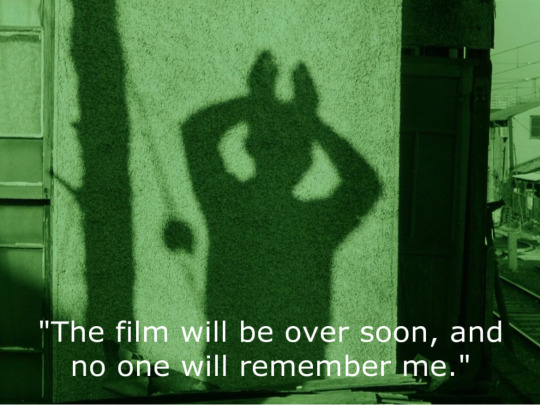
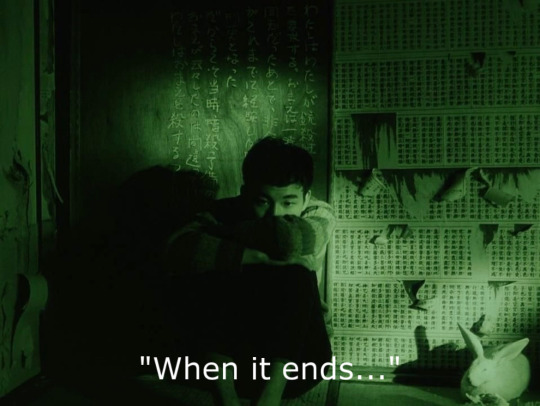
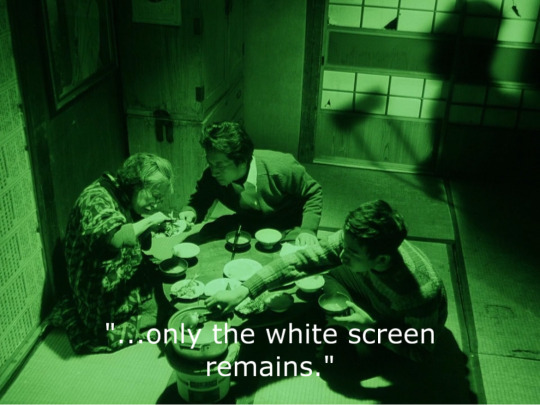
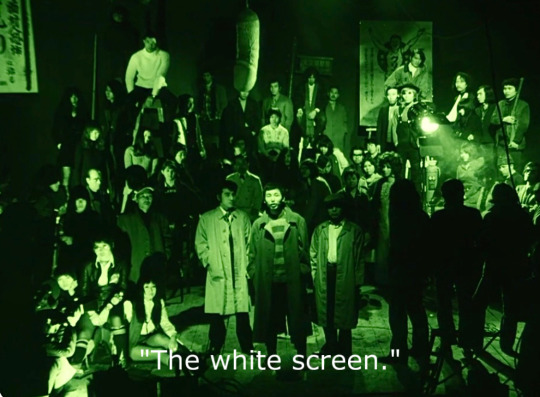
[i can’t forget him]
Throw away your books, rally in the streets
Dir. Shuji Terayama
137 mins.
#cinema#movies#film#coming of age#asian cinema#indie movie#lgbtq cinema#japan#japanese cinema#lgbtq#philosophy#throw away your books#throw away your books rally in the streets#movie#70s#70s cinema#art#indie#aesthetic movies
3 notes
·
View notes
Text

went to a family thing, I’m full of them!!!!!!!!!!!!!!!
#althou they were all potato ones.. still great but not my favorite BUT STILL#i wish i couldve brought home some but I cleared them all </3 i’m kidding. kinda#GHDSJJFNDNF but I got to bring home a box of homemade gulab jamun hougghfhhd. amazing day and i somehow drove home okay without my glasses#those not versed in south asian cuisine will not know what these are LMAO sorry#but i felt like a kid again 😭 all these smells wuaghf. miss it already#my art#self#ralli
12 notes
·
View notes
Text
ranting about niche things in my own tags so i can come back to them at a later point and see if my opinions have changed (i was in a crowded area for longer than i wanted to today and need to get over my hater energy)
#the vball world anouncers in rio rn are pissing me off so bad.#like my girl emily usually doesnt annoy me but her points are being brought down by the absolute negativity of the other two...#like im not saying every anouncer gotta be like my man clayton cause im sure thats not everyones style but when hes not describing whats#happening the things hes adding are fun/mood lifting#like its such a chore to get through these anouncers negative ass commentary like every single play is a mistake#(unless it comes from their blorbos on the us team)#and instead of just telling us or framing it in an informative way they just have to use boring and overly negative tone.#its especially terrible since the 3 in antalya rn all have such better energy so like the contrast is brutal#hat off to clayton hes my fav but what i like about the 3 in antalya rn is that 1. they have a bit of whimsy in their soul 2. they sound#like theyre having a good time and enjoy the game 3. they will say a play that didnt go to plan without being an absolute fucking downer#about it.#like i fr have to mute games sometimes ...#idk clayton is blorbo from my anouncement panel like when he gets so excited i as a listener get so excited when hes scereaming cause the#rally is so intense im screaming when he is in tears over carolanne kiss at 22 world champs im also in tears like come on#also will never forgive /that one/ for the way they speak about the asian teams/brasil cause dont be a commentator for international events#if youre gonna be weird about it.....#not to sound like i hate all these anouncers cause i dont. as i said the three in antalya are absolutely on it but it sucks that have the#tournament is lowkey ruined for me....#thats dramatic but its just not as fun#like when brasil would score and we'd still be getting a run down of jordan larsons biography... like shes a good player but lets give the#teams equal energy here#sigh
2 notes
·
View notes
Text
youtube
#gorgeous#sexyladyasian#asian doll#beautiful#female hips#hips & ass#sexy hips#curvy hips#thick hips#hip hop#hiphop#hip#underground hip hop#funny#humor#rally car#race car#pc games#ps4#gaming#youtube#business#science#retrowave#lofi aesthetic#vaporwave#chillwave#synthwave#lofihiphop#lofi beats
0 notes
Text
South Africa’s genocide case has put the spotlight on a deeper fault line in global geopolitics. Beyond the courtroom drama, experts say divisions over the war in Gaza symbolize a widening gap between Israel and its traditional Western allies, notably the United States and Europe, and a group of nations known as the Global South — countries located primarily in the southern hemisphere, often characterized by lower income levels and developing economies.
Reactions from the Global North to the ICJ case have been mixed. While some nations have maintained a cautious diplomatic stance, others, particularly Israel’s staunchest allies in the West, have criticized South Africa’s move.
The US has stood by Israel through the war by continuing to ship arms to it, opposing a ceasefire, and vetoing many UN Security Council resolutions that aimed to bring a halt to the fighting. The Biden administration has rubbished the claim that Israel is committing genocide as “meritless,” while the UK has refused to back South Africa.[...]
As a nation whose history is rooted in overcoming apartheid, South Africa’s move carries symbolic weight that has resonated with other nations in the developing world, many of whom have faced the burden of oppression and colonialism from Western powers.
Nelson Mandela, the face of the anti-apartheid movement, was a staunch supporter of the Palestine Liberation Organization and its leader Yasser Arafat, saying in 1990: “We align ourselves with the PLO because, akin to our struggle, they advocate for the right of self-determination.”
Hugh Lovatt, a senior policy fellow with the Middle East and North Africa Programme at the European Council on Foreign Relations, said that while South Africa’s case is a continuation of its long-standing pro-Palestinian sympathies, the countries that have rallied behind it show deeper frustrations by the Global South.
There is “a clear geopolitical context in which many countries from the Global South have been increasingly critical over what they see as a lack of Western pressure on Israel to prevent such a large-scale loss of life in Gaza and its double standards when it comes to international law,” Lovatt told CNN.
Much of the non-Western world opposes the war in Gaza; China has joined the 22-member Arab League in calling for a ceasefire, while several Latin American nations have expelled Israeli diplomats in protest, and several Asian and African countries have joined Muslim and Arab nations in backing South Africa’s case against Israel at the ICJ.
For many in the developing world, the ICJ case has become a focal point for questioning the moral authority of the West and what is seen as the hypocrisy of the world’s most powerful nations and their unwillingness to hold Israel to account. [...]
Israel sided with the West against Soviet-backed Arab regimes during the Cold War, and Western countries largely view it “as a fellow member of the liberal democratic club,” he added.[...]
“But the strong support of Western governments is increasingly at odds with the attitudes of Western publics which continue to shift away from Israel,” Lovatt said.
Israel has framed the war in Gaza as a clash of civilizations where it is acting as the guardian of Western values that it says are facing an existential threat.
“This war is a war that is not only between Israel and Hamas,” Israeli President Isaac Herzog told MSNBC in December. “It’s a war that is intended – really, truly – to save Western civilization, to save the values of Western civilization.”
So far, no Western countries have supported South Africa’s case against Israel.
Among Western states, Germany has been one of the most vocal supporters of Israel’s campaign in Gaza. The German government has said it “expressly rejects” allegations that Israel is committing genocide in Gaza and that it plans to intervene as a third party on its behalf at the ICJ.
An opinion poll by German broadcaster ZDF this week however found that 61% of Germans do not consider Israel’s military operation in the Gaza Strip as justified in light of the civilian casualties. Only 25% voiced support for Israel’s offensive.
But it is in Germany’s former colonial territory, Namibia, that it has attracted the fiercest criticism.
The Namibian President Hage Geingob in a statement on Saturday chided Berlin’s decision to reject the ICJ case, accusing it of committing “the first genocide of the 20th century in 1904-1908, in which tens of thousands of innocent Namibians died in the most inhumane and brutal conditions.” The statement added that the German government had not yet fully atoned for the killings.
Bangladesh, where up to three million people were killed during the country’s war of independence from Pakistan in the 1970s, has gone a step further to file a declaration of intervention in the ICJ case to back South Africa’s claims, according to the Dhaka Tribune.
A declaration of intervention allows a state that is not party to the proceedings to present its observations to the court.
“With Germany siding with Israel, and Bangladesh and Namibia backing South Africa at the ICJ, the geopolitical divide between the Global South and the West appears to be deepening,” Lovatt said.
Traditionally, the West has wielded significant influence in international affairs, but South Africa’s move signals a growing assertiveness among Global South nations that threatens the status quo, says Adekoya.
“One clear pattern emerging is that the old Western-dominated order is increasingly being challenged, a situation likely to only further intensify as the West loses its once unassailably dominant economic position,” Adekoya said.
19 Jan 24
2K notes
·
View notes
Text
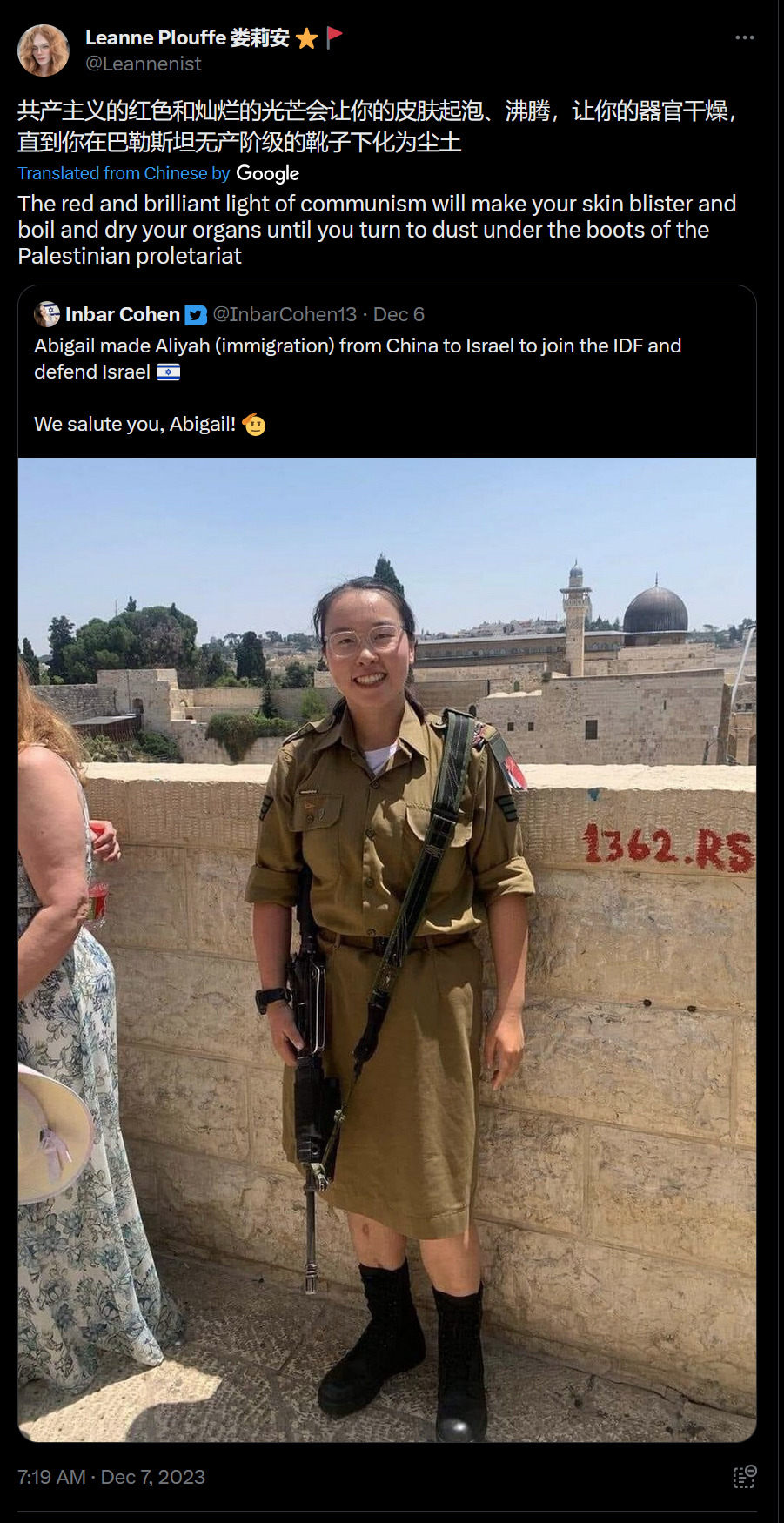
link
I can't properly put into words the amount of disgust that I feel seeing someone who looks like she could be my cousin fight for a genocidal occupational force like Israel but I will say this.
If you are Chinese, Korean, Japanese or any one of these Asian ethnicities that the West deem "acceptable" and you align yourselves with western-backed racial supremacy, you are making fools of yourselves. You have fallen prey to the myth of the "model minority" and you are suckers for it.
The premise of racial supremacy is based on exclusivity. And here's a dose of reality - the myth of the "model minority" is nothing but a tactic to placate you. To sow divide in the ranks of people of colour. To artificially manufacture another realm of racial supremacy in minorities so that you're distracted from how we all suffer under colonialism.
Did we all forget about the skyrocketing of sinophobia in the wake of the first COVID outbreak? The transformation of Chinese people into fiends with barbaric eating customs, poor hygiene, and mass conspiracy to infect the world with biological weapons?
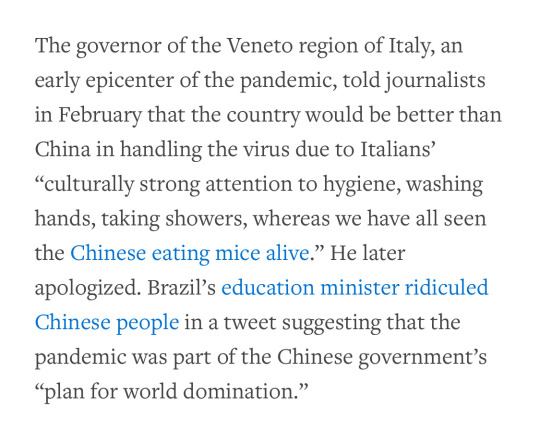
link
What about the hate-crimes? The attacks in the street against anyone visibly asian? The rampant discrimination and ostracisation from society?
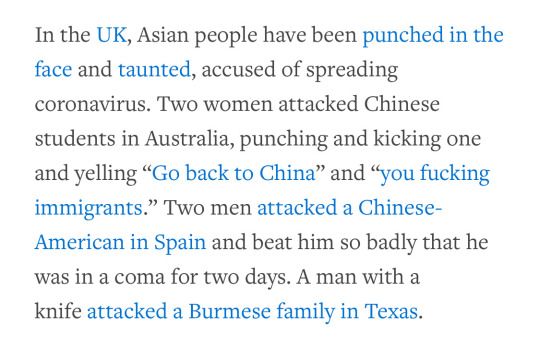
In 2020, Donald Trump referred to COVID-19 as "The Chinese Virus", "Kung-flu" at a campaign rally to raucous applause, a chilling echo of the times where fears of the "Yellow Peril" had the western world in a stranglehold.
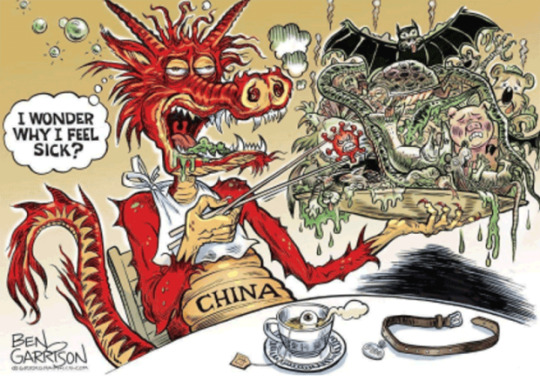
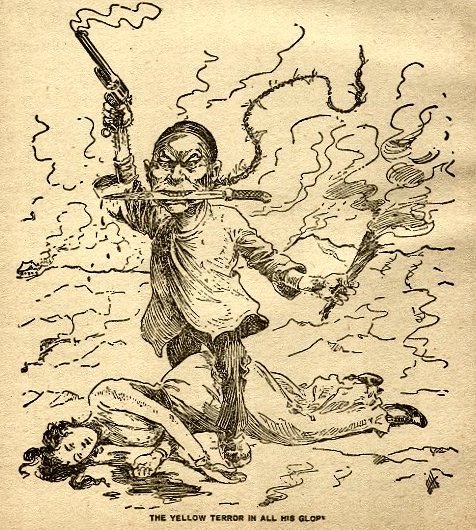
For all that Chinese people have been lauded as "prodigies" and "well-mannered workers", the moment our existence was incovenient, were were nothing more than another target. And although Chinese suffering then wasn't close to the scale of suffering that Palestinians now endure, we all received a reminder on what it was like to be in the world's crosshairs.
Now, in 2023, Biden dismisses death tolls as unreliable and remains proudly Zionist even after Netanyahu described the genocide Israel is inflicting upon Palestine as the "struggle between the children of light and the children of darkness, between humanity and the law of the jungle." At the same time, Palestinians are being compared to fleeing rats in a gesture of dehumanisation that mirrors how the Nazis portrayed Jews during the Holocaust.
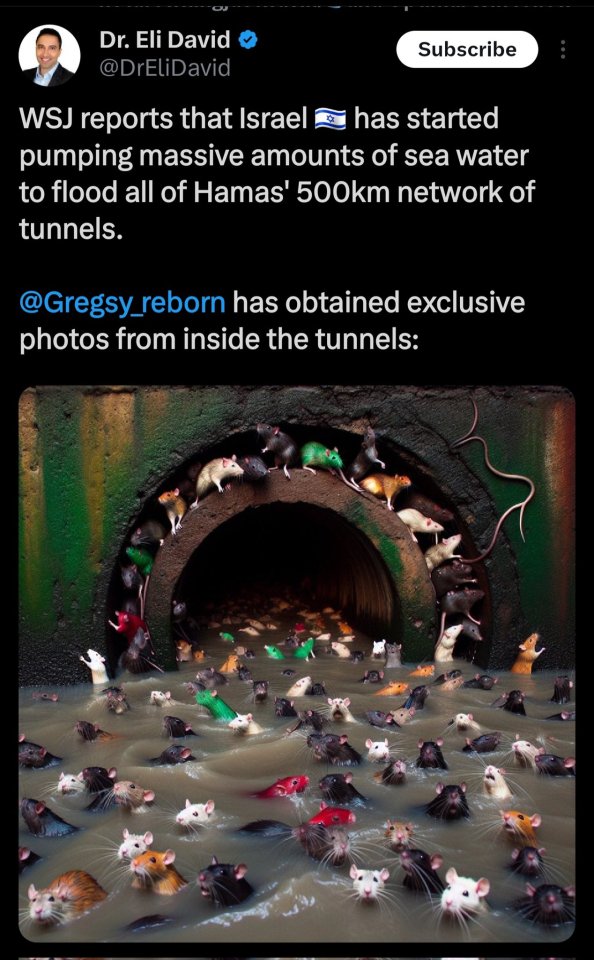
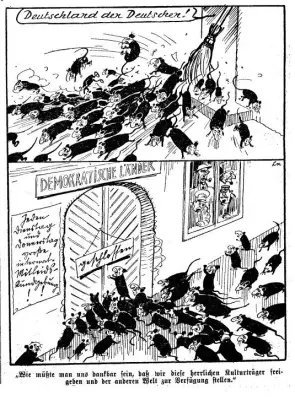
link
And let's not think Abigail's Jewishness will save her, not when it's been proven that Israel has administered contraceptives to Ethiopian Jewish immigrants without their consent. Racial supremacy is an exclusive club that never stops getting smaller, and there is nothing that you, as a minority, will ever be able to do to fit in. One day, you too will be a target and there'll be nothing you can do but blame yourself. After all - it's already happened.
So shame on Abigail. Truly. With the memory of knowing what it's like to be targeted for factors out of your control fresh in her mind, she happily fights to do the same to others. And that says more about her than I ever will be able to.
#this may be long winded and wordy but i had to get this off my chest#as a chinese-australian woman who does her best to be proud of her chinese heritage#this was a slap in the face#and ive tried lately to not inject my own voice into discussion about palestine bc i know there are people out there#who are more educated and more equipped with voices that need elevating more than mine do#but i think im allowed to talk about how enraged this made me#god.#free palestine#palestine#cw: mentions of sinophobia#colonialism
1K notes
·
View notes
Text
culture tips for writing asian settings: tea varieTEAs
atla's got major Tea Guy representation in iroh but let's be real, even non-tea guys are going to be drinking tea in an asian-inspired setting—you'd be served it instead of water most places. so, what kind of tea are you picking for them?
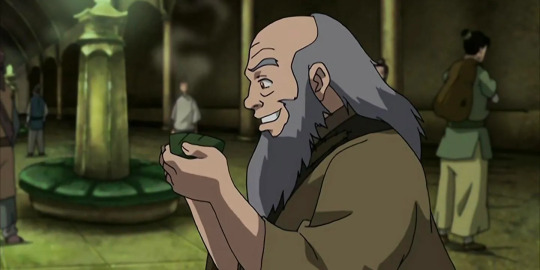
as an east asian reader, it can take me out of the setting to see the characters drink something like chamomile (from europe/west asia) or... most herbal teas, to be honest. ngl it was weird to see iroh in the show, characterised as a huuuuuuge tea snob, drink stuff like jasmine (it's fine it's just basic, is all! imo!) or like.... a random flower he encounters in the wild.
when we're talking tea, real asian tea, we're talking about the leaf of the camellia sinensis plant. the huge variety we have of tea is actually from the different ways of processing that exact same leaf. popular varieties include:
green: the leaf goes through minimal processing, can have a bright and even leafy/grassy flavour (examples: gunpowder, longjing aka dragon well, matcha, genmaicha)
white: also undergoes minimal processing, with a lighter flavour than even green (examples: silver needle, shou mei)
oolong: the leaf is semi-oxidised, curled, and twisted—can be characterised by a tanniny flavour with a bright aftertaste. my personal favourite! (examples: da hong pao, tieguanyin, dong ding, alishan)
dark (black): note this isn't the same as black tea as we think of it in english. the leaf is fermented to produce an earthy tea with a flavour like petrichor (examples: pu'er)
all the teas listed in the "examples" are fairly credible teas that i think a real tea snob like iroh would drink.

ok, but what about...
"black tea" as we know it in the west—assam and ceylon etc? this variety is actually called "red tea" in chinese. we don't drink it with milk but to be honest, i've just... never really heard of anyone drinking chinese red tea? which is why i've kept it off the list. (there's lapsang souchong, but i associate that with bri'ish people...) anyone who does drink it, let me know! on the other hand something like assam/ceylon, while extremely delicious and also asian, is a product of british colonialism and is consumed with milk. i think if you wanted to massage some of the traditions & have chai-drinking indian-influenced characters, though, that's cool!
do you actually not drink herbal tea? we do... but a lot of it is considered medicinal. we've got stuff like herbal "cooling tea" with ingredients like sour plum, mesona, or crysanthemum; tea that warms you up like ginseng or ginger. the whole concept of hot/cold in chinese medicine though... that deserves another culture post
camellia leaf murdered my family & i have a grudge against it; what else can my blorbos drink? there'a some good, tasty stuff made of wheat, barley, buckwheat, even soybean. wouldn't be egregious for the characters to drink that!
is milk sacriligeous? a real tea snob would think so, but a lot of asians nowadays are chill about milk in tea—usually in western-influenced red tea. hong kong, thailand, india, taiwan, and malaysia (among others) have their own cultures of milk tea, which has even become a democratic rallying point.
what do you think of iroh inventing bubble tea? my main issue with it is it's anachronistic! it was invented in taiwan in the late 20th century, but atla's set in the equivalent of the mid-19th century... you could also make arguments about whether iroh's too snobby about tea to invent it LOL
there's soooo much more i can say about all this so: keep your eyes peeled! i'll talk about medicine & tea ceremony in the near future <3
disclaimer | more tips
#atla#atla culture#atla meta#avatar the last airbender#iroh#asian culture tips#tea#so i'm making this post as not QUITE a certified Tea SnobTM the way iroh is#but i do really love and enjoy many east asian teas#and i start every day off with a cup of strong milk tea (probably reflecting my own cultural heritage tho ;) )#and i do look down on white ppl tisanes. that shit aint good!!
1K notes
·
View notes
Note
some people are mad at steven for a moral issue, tbf. regardless of your thoughts on watcher’s streaming service he did still say he has racist and homophobic friends. he still goes to a homophobic church.
I absolutely recognise that you must have been recently introduced to The Pod Clip that the twitter teens who hate him preserved to break out whenever it's a fresh moment to rally hate against him, but I would advise anyone just receiving this clip from August 2020 being passed around with the angle that Watcher tried to hide this. I and many others were there and just know that I have a zero tolerance standard for people who show no remorse or growth when they uplift racists and bigots.
Mine and other fans who were startled by the statement hoped publicly that it would be an opportunity to clear the air for Watcher because the current political climate was just finally examining anti-blackness in everyone's biases and as someone who is mixed-African growing up in an Asian household, I know that anti blackness is and has been a normalised mindset in the Asian community.
But the thing is, months before this, Steven platformed Tammy and her colleagues to discuss how all of us can work together to stop Asian hate and one of the conversations I highlighte back then was how very clear Tammy was that allyship from the Asian community to the African-American community was tantamount to moving forward. That the us vs them rhetoric has and continues to be harmful for both parties. Ryan and Steven were very involved in this discussion and agreed wholeheartedly.
Having said that, the narrative around the podcast ep never had a chance to be discussed rationally. It really ended up skewed because Steven's response to the backlash from that clip was this

I hope that's legible to you. Many people who felt uneasy about what he said felt a lot better and his intention to say something at the top of the next episode would once again, unfortunately, get derailed because Twitter users (some who are particularly loud about loving and supporting Watcher yet constantly join in on the throng of bullying as soon as the tide turns) were adamant that they needed Watcher to post the clip and Steven's apology publicly on their youtube front page and on the main socials, to literally advertise it when the reality is that not many people were watching/listening to the podcast. For what reason would it be intelligent or good business practice to broadcast this hurtful moment so that more people could get hurt by it?
Watcher's response amid the harassment was to release a full podcast episode where they all discussed what they would do going forward to show that they are allies, not just by not being racist or homophobic but by being anti-these things. They showed that they cared about their impact. It was emotional and devastating to watch and by that time, we knew the pod was likely going to wind down. 2020 was already a miserable time and it was made worse because no matter what Steven or Watcher said at the time, the "stans" on Twitter wanted the man fired, they posted memes saying the world would be better if Steven Lim didn't exist, they wanted him shamed by his staff, and for Ryan and Shane to publicly disavow him. Many of these so-called devoted fans raided the server to yell about how Steven's alleged homophobia hurts them, most of them were white and pointedly talking over people of colour telling them "it's not your apology to accept!". It was a blood bath.
And I see waaaay too many of the same faces utilizing this completely neutral move--that of COURSE could have been executed better--to terrorize Steven, to make petitions to get him fired, commenting on his wedding photo telling him that Tammy should leave him, posting those same damn disgusting memes because you see, a whole bunch of people forgot how disgusting and evil this vendetta was to the point where even watcher's socials started to FOLLOW some of these genuinely mean-spirited individuals. They didn't give a shit about a movement or activism.
What kills me--what absolutely THROWS me--is that these same people expect to be able to return to interacting with the staff, attending live shows, buying merch and sending fan mail as soon as the hate tide winds down. All these people so concerned about a statement referencing faceless hypothetical racists and homophobes that Steven never named nor attributed any context for--as he was never given the chance--are so quick to dehumanize and caricaturize real human beings to their faces and they think this is a normal and acceptable behaviour.
You'll have to excuse me, as an older fan who has seen my fair share of normalised homophobia and racism in these communities, if I disagree.
157 notes
·
View notes
Note
Here's a fun little Project Sekai fact! Almost all of your faves have appropriated other cultures as costumes and some have even done blackface. If you're supporting this game and refusing to make a meaningful statement about it beyond "b-b-but i said it was bad! 🥺", you are fucking racist.
You're either anti-racist, or you're a pro-seka blog. Choose one. You can't be both.
Basically everything is problematic and actually I have criticised the cultural appropriation and racism present in the game multiple times, at no point have I refused to acknowledge it (and you’re not the first person to send an anon in). You can play the game and be anti-racist actually it’s called being critical of the media you consume and having social awareness, we’ve been over this. Everything is problematic you probably like problematic media too.
Yeah the game did revival my dream and that was fucking racist, the costumes are stereotypical and they didn’t research into any specifc native culture they just wanted to make something that would get them money. it’s not princess mononoke put the trained costumes next to each other, the trained costumes are heavily stylised to look "pretty and fashionable" and forego accuracy. I’m aware of that, I’ve said this before multiple times but you wouldn’t know that because you just randomly came here to send me this message.
Then there's also the kamikou sports fes set. Luka's qipao is very obviously altered for the sake of fanservice which is just so wrong, do not sexualise other cultures for money. Rui's I think is meant to be some sort of military hanfu? But quite stylised, which again for someone outside the original culture to stylise a traditional outfit just is a no-go because you will probably get things wrong. Mizuki's outfit seems to be based on Qi-lolita and there's a whole thing surrounding that about whether you should wear it if you aren't chinese.
and then there's the island panic cards which are both orientalist. yes, not just the boys, the girls too. the outfits aren't based on any specific culture and just mishmash different swana and south asian cultures and stereotypes together to make something that looks "exotic".
If you notice a recurring thing is that all of these are in some way wxs related, and wonder why that is, it’s because they’re the theatre unit. They wear costumes, these are just cultures being appropriated as stage outfits, because the devs don’t care they just want a quick bit of money.
all of these are horribly common in idol games and gacha games, not just project sekai, and it's important to recognise the problems rather than just blindly consuming it. If it makes money, devs will continue to include ca, recognise that.
and yeah puchiseka episode 6 happened at no point have i ever denied that. it should have never happened but it did and at the very least the fandom was able to rally together and get sega to take it down. even after they did that sega and clpl should still be held accountable for even letting it be released. while they didn't make the episode, that was entirely handled by an external company (who should also be held accountable for their actions - we're never getting a second season for a reason), sega still released it knowing full well the contents. it wasn't ganguro like people said it was extremely clearly based on a very racist and crude interpretation of african tribes, and for part of a joke no less. It was disgusting. And it’s not ganguro like how people defend it; ganguro is part of the gyaru subculture and the outfits in that episode were not that. there is no defence for what happened. at the very least, it was impressive that the fandom called out the episode and actually got staff to listen and learn. that doesn't happen in other games, and we managed to do it again with rmd. the fanbase is calling the game out and actually educating staff. It’s just critical consumption - fans of the media were able to recognise that the episode was racist and correctly called out management with enough of a voice to make staff correct their mistakes. They apologised, it’s not my apology to accept, and I still hold them accountable for the fact it even happened.
This probably all makes me sound like a white saviour, and I don’t want to speak over the people affected by this, but that’s what you wanted, isn’t it? You probably have me blocked already and never followed me in the first place, but if you really wanted to call out racism, then maybe you should’ve sent this to blogs that do turn a blind eye to the flaws in this game, not one that calls them out. Why just me? Was it because of the username, because you’re not the first person to make that quip. I know you won’t see this anon, but a word of advice. Most media is problematic one way or another, you can enjoy something but still be aware of and acknowledge its problems. Project sekai is not made with the intent of encouraging or funding harmful behaviour, yet it still includes some harmful content. Call it out, educate staff and tell them not to do it again, they listened once they can do it again.
205 notes
·
View notes
Text

Writer Spotlight: Elise Hu
We recently met with Elise Hu (@elisegoeseast) to discuss her illuminating title, Flawless—Lessons in Looks and Culture from the K-Beauty Capital. Elise is a journalist, podcaster, and media start-up founder. She’s the host of TED Talks Daily and host-at-large at NPR, where she spent nearly a decade as a reporter. As an international correspondent, she has reported stories from more than a dozen countries and opened NPR’s first-ever Seoul bureau in 2015. Previously, Elise helped found The Texas Tribune, a nonprofit digital start-up, after stops at many stations as a television news reporter. Her journalism work has won the national Edward R. Murrow and duPont Columbia awards, among others. An honors graduate of the University of Missouri School of Journalism, she lives in Los Angeles.
Can you begin by telling us a little bit about how Flawless came to be and what made you want to write about K-beauty?
It’s my unfinished business from my time in Seoul. Especially in the last year I spent living in Korea, I was constantly chasing the latest geopolitical headlines (namely, North Korean leader Kim Jong Un’s big moves that year). It meant I didn’t get to delve into my nagging frustrations of feeling second-class as an Asian woman in Korea and the under-reported experiences of South Korean women at the time. They were staging record-setting women’s rights rallies during my time abroad in response to a stark gender divide in Korea. It is one of the world’s most influential countries (and the 10th largest economy) and ranks shockingly low on gender equality metrics. That imbalance really shows up in what’s expected of how women should look and behave. Flawless explores the intersection of gender politics and beauty standards.
Flawless punctuates reportage with life writing, anchoring the research within your subjective context as someone who lived in the middle of it but also had an outside eye on it. Was this a conscious decision before you began writing?
I planned to have fewer of my personal stories in the book, actually. Originally, I wanted to be embedded with South Korean women and girls who would illustrate the social issues I was investigating, but I wound up being the narrative thread because of the pandemic. The lockdowns and two years of long, mandatory quarantines in South Korea meant that traveling there and staying for a while to report and build on-the-ground relationships was nearly impossible. I also have three small children in LA, so the embedding plan was scuttled real fast.
One of the central questions the book asks of globalized society at large, corporations, and various communities is, “What is beauty for?” How has your response to this question changed while producing Flawless?
I think I’ve gotten simultaneously more optimistic and cynical about it. More cynical in that the more I researched beauty, the more I understood physical beauty as a class performance—humans have long used it to get into rooms—more power in relationships, social communities, economically, or all of the above at once. And, as a class performance, those with the most resources usually have the most access to doing the work it takes (spending the money) to look the part, which is marginalizing for everyone else and keeps lower classes in a cycle of wanting and reaching. On the flip side, I’m more optimistic about what beauty is for, in that I have learned to separate beauty from appearance: I think of beauty in the way I think about love or truth, these universal—and largely spiritual—ideas that we all seek, that feed our souls. And that’s a way to frame beauty that isn’t tied in with overt consumerism or having to modify ourselves at all.
This is your first book—has anything surprised you in the publishing or publicity process for Flawless?
I was most surprised by how much I enjoyed recording my own audiobook! I felt most in flow and joyful doing that more than anything else. Each sentence I read aloud was exactly the way I heard it in my head when I wrote it, which is such a privilege to have been able to do as an author.
Do you have a favorite reaction from a reader?
I don’t know if it’s the favorite, but recency bias is a factor—I just got a DM this week from a woman writing about how the book helped put into words so much of what she felt and experienced, despite the fact she is not ethnically Korean, or in Korea, which is the setting of most of the book. It means a lot to me that reporting or art can connect us and illuminate shared experiences…in this case, learning to be more embodied and okay with however we look.
As a writer, journalist, and mother—how did you practice self-care when juggling work commitments, social life, and the creative processes of writing and editing?
I juggled by relying on my loved ones. I don’t think self-care can exist without caring for one another, and that means asking people in our circles for help. A lot of boba dates, long walks, laughter-filled phone calls, and random weekend trips really got me through the arduous project of book writing (more painful than childbirth, emotionally speaking).
What is your writing routine like, and how did the process differ from your other reporting work? Did you pick up any habits that you’ve held on to?
My book writing routine was very meandering, whereas my broadcast reporting and writing are quite linear. I have tight deadlines for news, so it’s wham, bam, and the piece is out. With the book, I had two years to turn in a manuscript. I spent the year of lockdowns in “incubation mode,” where I consumed a lot of books, white papers, articles, and some films and podcasts, just taking in a lot of ideas to see where they might collide with each other and raise questions worth reporting on, letting them swim around in the swamp of my brain. When I was ready to write, I had a freelance editor, the indefatigable Carrie Frye, break my book outline into chunks so I could focus on smaller objectives and specific deadlines. Chunking the book so it didn’t seem like such a massive undertaking helped a lot. As for the writing, I never got to do a writer’s retreat or some idyllic cabin getaway to write. I wrote in the in-between moments—a one or two hour window when I had a break from the TED conference (which I attend every year as a TED host) or in those moments after the kids’ bedtime and before my own. One good habit I got into was getting away from my computer at midday. I’m really good about making lunch dates or going for a run to break up the monotony of staring at my screen all day long.
What’s good advice you’ve received about journalism that you would pass on to anyone just starting out?
All good reporting comes from great questions. Start with a clear question you seek to answer in your story, project, or book, and stay true to it and your quest to answer it. Once you are clear on what the thing is about, you won’t risk wandering too far from your focal point.
Thanks to Elise for answering our questions! You can follow her over at @elisegoeseast and check out her book Flawless here!
#writer spotlight#elise hu#flawless#k-beauty#beauty#beauty industry#feminism#gender politics#seoul#south korea#journalism#writing advice#reportage#flawlessthebook
239 notes
·
View notes
Text

In 1926, Margaret Sanger, the founder of Planned Parenthood, was a guest speaker at a KKK rally in Silverlake, New Jersey. She also gave a guest lecture to the women's auxiliary of the KKK.
Multiple "fact check" websites claim (to this day) she was never connected to the Ku Klux Klan in any way, but history recorded in photos and audio isn't so easily washed away. In fact, a fact sheet released by Planned Parenthood itself in 2016 acknowledged that Sanger did make speeches about birth control at KKK meetings. The truth is clear, Planned parenthood was founded by a woman who was openly racist and who promoted genocide against races she considered 'degenerate' which included Asians, Latinos, Africans, Polynesians, etc.
159 notes
·
View notes
Text
"In the name of keeping students safe, you bring the NYPD on campus to break up a peaceful encampment, thereby endangering hundreds of student protesters—many of whom are Jewish students and students of color—and the campus community at large. Given the NYPD’s racist record, the fact that you would subject Black, Latinx, Arab and South Asian students to police repression suggests that you are either unaware or indifferent to the trauma our communities have experienced with the police. And your administration’s decision to evict students from their dorms, strip them of their meal cards, and have them charged with trespassing is nothing less than vindictive. After taking their tuition and fees, you render them houseless and potentially food insecure. How does this make students safe? As president, you must be well aware of the number of financially vulnerable students enrolled at Columbia.
In the name of keeping students safe, you suspend chapters of Students for Justice in Palestine (SJP) and Jewish Voice for Peace (JVP) for organizing a peaceful protest in order to draw attention to Israel’s genocidal war on Gaza and its escalation of violence in the West Bank. When two students attacked an antiwar rally on the steps of Low Memorial Library on January 19 by dousing the assembled with a foul-smelling chemical agent, sending several people to the hospital, what did you do to keep students safe? The assailants were not arrested, and although Columbia’s interim provost announced that they were banned from campus soon after the attacks, the decision to suspend them was made public just a few days ago. Instead, you brought the NYPD to campus to suppress a follow-up protest organized to call attention to the attack.
When Mohsen Mahdawi, a Palestinian student, received death threats from someone involved in a counterprotest, no one called for an investigation or took affirmative steps to keep him safe. And when will you release a statement expressing deep sympathy for all of your Palestinian students who have lost family and friends to Israel’s military onslaught?
...
I need not say much else. You’ve been condemned by your faculty, by the majority of students, and by scholars and human rights activists around the world. You are keeping no one safe, except for your donors, trustees, and Columbia’s endowment. Among these same trustees and donors are persons who have vowed to punish these students by blocking them from future employment.
...
Sadly, you are not alone in turning to state repression to silence students. The presidents of Yale, Princeton, Emory, the University of Southern California, the University of Texas at Austin, the Ohio State University, the University of Pittsburgh, and Emerson, among others, have also called the police against nonviolent protests and encampments. This is a dark day for U.S. higher education, especially at a time when right-wing extremists are waging war on academic freedom and all manner of critical studies.
#palestine#free palestine#isreal#gaza#genocide#apartheid#colonization#american imperialism#us politics#police state#settler colonialism#settler violence#student protests#columbia#columbia university
45 notes
·
View notes
Text
By Struggle-La Lucha New York bureau
Hundreds of people rallied for Palestine in the Jackson Heights section of Queens, New York City, on Feb. 24. They gathered in Diversity Plaza, the center of a South Asian community.
“Honor Our Martyrs” was the event’s title. It commemorated the freedom struggles of both the Palestinian and Bengali peoples.
#FreePalestine#GazaGenocide#protest#Queens#NYC#Jackson Heights#Bangladesh#immigrants#solidarity#Struggle La Lucha
73 notes
·
View notes
Text
I went to the SF rally to support the protests in Iran earlier today and I can’t explain how many people were there.
Women in hijab, Iranians of all ages, queer activists, an elderly Asian woman with a sign that said “I am not free while there are still women who are unfree”, men chanting at the top of their lungs. Children who might just grow up in a world without the problems we’re fighting to end.
Children of Iran, we hear you, we love you, and we support you.
461 notes
·
View notes
Text
Love in Translation Ep 8 (Finale) Stray Thoughts
Last week, we went off the deep end with Yang being kidnapped and being forced to work on a packaging warehouse in his skinny jeans to pay back his debts. He was able to smuggle messages out by changing delivery addresses and using the language learning code he taught Phumjai. The rest of the cast rallied around to support Phumjai when they didn't know what had happened to Yang, and also Phojai and Tag reconciled beautifully. Phumjai went rogue to try and rescue Yang alone, and now both have been captured.
1:09:32 finale!!
Phumjai really had no plan and got hurt.
Now Phojai and Tag have showed up with no plan. What the hell is this?
All these boys trying to sacrifice themselves only works because these characters have cared so much for each other consistently.
We're doing PPL in the middle of the crisis. I love it. We need 5 million baht. Perhaps if the audience buys this camera we'll save the boys?
What is Bojji up to?
We took of Ngern's shirt and made him sweat, but at what cost?
The PPL is driving me insane this week. You're too injured to lift things. Good thing we have this app to our local wholesaler.
Oh no, Bojji is having issues as well.
I like that Phumjai is stepping up and putting the money he has on the line in a way that asks Yang to trust him more.
Okay, I like this show ending the debt collection on a comedic note.
Curious what Yang does long term if he's given his shares to the employees.
Phojai and Tag are moving in together!!
Obsessed with these two playing baseball as a quality time exercise.
What is it with these dramas and showing a scene from even further back as a beginning of romance event? This is specific to Asian dramas.
Final episode brotherly context and emotional reconciliation. I'm okay with it.
More PPL. I'm losing my mind, but glad this little show must have succeeded.
This episode is so weird, but I'm having fun.
Qi'er and Bojji are so valid for the screaming and falling out.
The parents look so pleased about Yang and Tag.
Little Sun is going franchise, baby!
DID TAMMY TURN THEM INTO A NOVEL?? SHE SAID I'M GETTING PAID BACK FOR Y'ALL USING MY LIKENESS IN YOUR STORE AND PLAYING WITH MY FEELINGS!
They said the name of the show. Finish your drinks.
And now they're proposing? This show has everything.
Okay. Drawing the ring on Yang"s finger was so goddamn cute.
Of course they met as kids. These dramas love the notion of destiny.
Final Verdict: 8.5, This Show Was So Much Fun. Phumjai and Yang are one of my favorite pairs of the year. I liked the way they fell for each other and the way this show used its workplace. The plot wobbled massively throughout the final two episodes, and we lost the thread on a few things along the way for product placement, but I really loved these characters so much and I loved the way they treated each other. I'm going to miss having this show in the balance. Offroad and Daou and friends did a great job here.
36 notes
·
View notes
Photo

On this day, 24 April 1976, the far-right National Front organised a march through the main Asian area in Bradford, northern England. Local politicians organised a counter-rally in the centre of town but hundreds of young Asians broke away, fought through police lines and attacked the racists. The incident helped catalyse Asian youth resistance to racism the city, as many participants in the battle came together to form the Asian Youth Movement, which combated racist street violence, as well as racism by police and the state. In our podcast Tariq Mehmood, one of the participants, recounted to us: "We would not let the fascists march in our areas. The police were protecting them and allowing them to march and have a meeting in our area. That would lay the basis of thinking in our heads that somewhere along the line, we needed our own organisations… We didn’t trust the police and not because we were anti-police at the time but just because of what they were doing to us. We didn’t believe they would defend us and besides, it was our duty to protect our areas." More info in our podcast episodes 33-34, available on your favourite podcast app or on our website: https://workingclasshistory.com/2019/09/18/e28-29-asian-youth-movements-in-bradford/ To access this hyperlink, click our link in bio then click this photo https://www.facebook.com/photo.php?fbid=614461127393773&set=a.602588028581083&type=3
95 notes
·
View notes